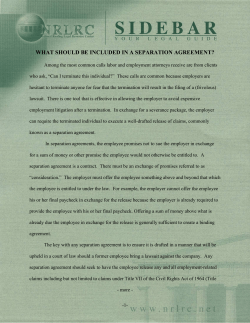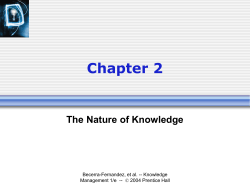
Why Buy Employment Practices Liability Insurance?
Why Buy Employment Practices Liability Insurance? The tremendous increase in employment-related litigation during the past several years makes Employment Practices Liability (EPL) insurance an essential coverage. EPL insurance covers settlements, judgments and legal defense costs in employment related lawsuits. Every company with employees may face a potentially catastrophic liability arising out of claims under the Fair Labor Standards Act and its state counterparts, Title VII, ADEA, ADA and state FEP statutes, public accessibility under ADA Title III and state laws, and state common law claims. The Equal Employment Opportunity Commission (EEOC) received a record 95,402 private sector discrimination charges in 2008, a 15.2 percent increase from 2007.1 The EEOC also filed 290 “merits” lawsuits in fiscal 2008, while also resolving 339 suits for a total recovery of about $102.1 million. The 339 lawsuits resolved by the EEOC during fiscal 2008 were comprised of:2 Type No. Title VII of the 1964 Civil Rights Act claims Resolutions 265 $65.6 million ADA claims 47 $30.3 million Age Discrimination in Employment Act claims 41 Equal Pay Act claims More than one statute 3 $971,961 $1.7 million The EEOC reported “four noteworthy resolutions” of systemic cases in 2008:3 1.A $27.5 million settlement of age discrimination claims against the law firm of Sidley & Austin 2.A $4.3 million settlement on behalf of a class of Hispanic warehouse workers at B&H Foto & Electronics 3.A $2.2 million settlement of harassment and retaliation claims against New York’s Tavern on the Green 4.A $1.6 million race discrimination settlement with Visteon Corp. and Ford Motor Co. on behalf of black workers allegedly denied entry to apprenticeship programs Other trends employers should be aware of when considering the purchase of EPL coverage include: • Small companies in all industries are increasingly subject to large settlements and damage awards, not to mention significant defense costs. Sectors such as healthcare and higher education have been hit particularly hard. • A rising number of employment class action lawsuits are being filed in state and federal courts in all jurisdictions. Plaintiffs continue to press to broaden the grounds for class action litigation, aggressively pursuing claims based on use of subjective criteria in making employment decisions. Further, plaintiffs, the courts, and agencies are employing new statistical methods and arguments to bolster class action claims. Many employers believe employment lawsuits are covered under their Commercial General Liability (CGL) or Directors and Officers (D&O) Liability policy. In fact, CGL policies typically cover only claims involving bodily injury, property damage, and “Personal Injury.” (“Personal Injury” includes false arrest, detention, malicious prosecution, libel, slander, defamation, and violation of right to privacy.) The CGL generally excludes liability for discrimination, harassment, or other employment practices. Furthermore, CGL policies typically exclude intentional acts, as commonly claimed in employment suits. Representative Class Action Settlements and Awards • A $175 million jury verdict against Wal-Mart in a California case involving breaks and meal times • A $19.1 million judgment against Family Dollar Stores in a federal case in Alabama for overtime • A $49 million settlement by Verizon of a pregnancy discrimination class action based upon decades-old practices by Verizon predecessor companies • A $14.9 million settlement of an overtime lawsuit by video game producer Electronic Arts • A $1.4 billion settlement of an IBM pension dispute Source: BNA 1 2 3 Equal Employment Opportunity Commission (EEOC) Fiscal Year 2008 Performance and Accountability Report , page 9 (http://www.eeoc.gov/abouteeoc/plan/ par/2008/par2008.pdf) Ibid. BNA, Daily Labor Report, No. 226, November 24, 2008, pp. A1-A2 Most importantly, many CGLs (including those incorporated in a BOP) have a specific a Employment Related Practices Exclusion “for claims arising out of or in the course of employment.” Directors and Officers (D&O) Liability policies provide insurance for negligent acts, omissions, or misleading statements committed by directors and officers of a company that result in lawsuits being filed against the company. D&O coverage can be purchased to reimburse the company when it indemnifies directors or officers, to specifically cover directors or officers when the company does not indemnify them or can provide entity coverage to cover claims made specifically against the company. A D&O Liability policy may provide some (limited) protection for individual officers and directors, but not for the employer or its non-executive employees. On the other hand, EPL insurance is designed to reimburse an insured employer for the costs of defending an employment lawsuit, including legal fees, judgments and settlements. EPL insurance covers claims brought by employees, former employees, or potential employees alleging discrimination, workplace harassment, and wrongful discharge. More comprehensive EPL policies are available that also cover claims alleging invasion of privacy, defamation and intentional infliction of emotional distress, wrongful failure to employ or promote, negligent supervision, and improper evaluations, among other covered acts. As mentioned above, cases against employers are on the rise, and no employer is immune to employment lawsuits. Third parties, such as customers and clients, are also more frequently seeking legal recourse for alleged discrimination or harassment. In this environment, EPL insurance is essential to mitigate the potentially devastating financial impact of judgments, settlements, and defense costs for employmentrelated litigation. Kibble & Prentice can also be a risk management resource, helping design non-insurance solutions to minimize exposures. A Sampling of Employment Practices Settlements: • In one of the largest single-plaintiff discrimination judgments, a jury awarded $29.3 million in a sexual discrimination claim brought by an individual against one of the largest banks in Europe. • A jury in a Florida district court returned a $1.34 million verdict against a security company in a sexual harassment and retaliation lawsuit brought by the EEOC on behalf of four former employees. • A national clothing retailer settled back-to-back class action lawsuits alleging racial discrimination and race and national origin discrimination for a total of $90 million. • A Texas-based company specialized in coating equipment and application settled a racial harassment suit brought by the EEOC on behalf of one African American employee for more than $1 million. • A food services company agreed to pay $80 million to settle a lawsuit brought by thousands of employees alleging race discrimination. • A New York hospital settled a sexual harassment class action suit brought by the EEOC on behalf of female employees for $5 million. • An aerospace company settled a sex discrimination lawsuit brought by some 29,000 current and former female employees for $72.5 million. Seth Shapiro, Senior Vice President & Risk Strategist, Risk Strategies Group (206) 441-6300 www.kpcom.com IRS Circular 230 Disclosure: Kibble & Prentice Holding Co. and its affiliates do not provide tax advice. Accordingly, any discussion of U.S. tax matters contained herein (including any attachments) is not intended or written to be used, and cannot be used, in connection with the promotion, marketing or recommendation by anyone unaffiliated with Kibble & Prentice Holding Co. of any of the matters addressed herein or for the purpose of avoiding U.S. tax-related penalties. Also, the information contained in this brochure should not be construed as medical or legal advice and is intended for educational purposes only. Kibble & Prentice operates in the State of California under the name of Kibble & Prentice Holding Company dba Kibble & Prentice Insurance Agency (0E28835). ©2009 Kibble & Prentice Holding Company, All rights reserved
© Copyright 2025





















